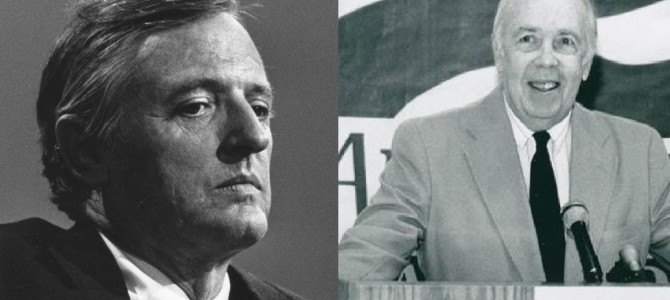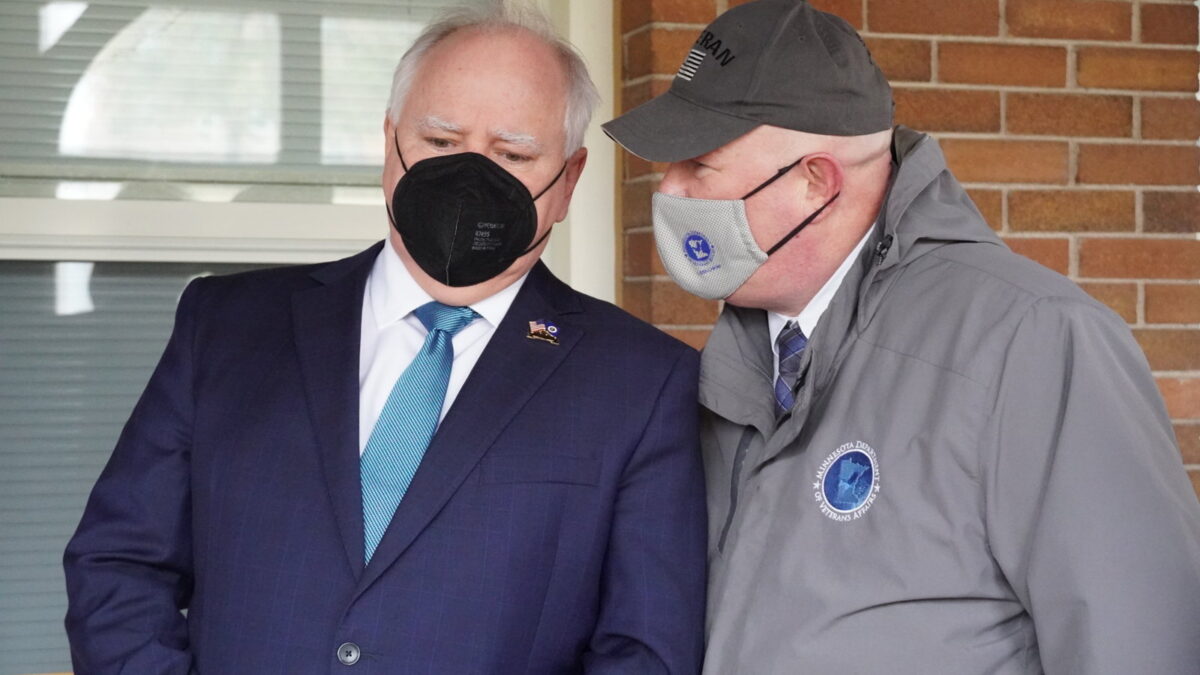
Stanton Evans, who died on March 3, was Everyman’s William F. Buckley Jr.
Buckley, who died in 2008, was eight years older than Evans, but their early training was similar, and they were both precocious, productive, and busy. Very busy.
Both went to Yale (Stan graduated magna cum laude, Phi Beta Kappa). Both were editors of the Yale Daily News. After Yale, both wrote for The Freeman, a conservative magazine edited by Frank Chodorov, and both wrote for Human Events. And both were writing for National Review by 1956. Buckley had founded the magazine the previous November, at the age of 29; Evans was named editor of the Indianapolis News at the age of 26, making him the country’s youngest editor of a metropolitan daily newspaper.
Both helped create the conservative movement. Buckley played a founding role in Young Americans for Freedom, the New York State Conservative Party, the Philadelphia Society, and the Fund for American Studies. Evans, at the age of 26, wrote the Sharon Statement and Young Americans for Freedom’s guiding principles, the latter still the Declaration of Independence of the conservative movement. Evans also founded the National Journalism Center and the Education and Research Institute.
Both wrote columns, both appeared on television, and both gave speeches.
Stan Evans, in Contrast to Bill Buckley
But they were very different people. Buckley was a suave, patrician, boarding-school, secret-society (Skull and Bones) Yalie, with an international upbringing (his first language was Spanish; his family lived for a time in France and England when he was a boy), a cosmopolitan demeanor, and an accent so famous it made a cameo appearance, with the help of Robin Williams, in the movie “Aladdin.” Evans was born in Texas but grew up in Maryland, going to public schools—except for his final year of high school, when he went to a private school because he was too young to go to Yale. Evans spoke with a drawl that seemed to unwind itself all the way from Texas to Maryland.
Buckley had smart dogs—mostly Cavalier King Charles spaniels. Sometimes two of them at a time. Very smart. Evans had one dog, Zip. With three legs. Nothing unusual, he would say, just your average three-legged dog.
Buckley traveled in a 60-foot schooner, a 44-foot yawl, a 36-foot sloop, and a stretch limousine, often with a gourmet meal packed by his wife, Pat, and Julian, the cook. Evans drove old Mustangs, T-Birds, and hatchbacks, and ate at Roy Rogers.
Buckley played the harpsichord. Evans played the guitar. Buckley liked Bach. Evans liked rock ‘n’ roll. Buckley had a staff of Spanish-speaking servants. Evans lived alone.
Buckley skied fanatically (he once raced my 11-year-old son down a mountain in Switzerland, launching him over a mogul; my son landed, did a yard sale, and broke both skis). And for a decade or two he exercised regularly at a gym (he called it “my mortification of the flesh”). There is no record extant, on earth or in Heaven, of Stan Evans’s ever having exercised. He said he didn’t like sports that required you to put something special on your feet.
Buckley worshiped regularly, and preferably in Latin. Evans was born a Methodist—at least, he was born of a Methodist. And he liked Calvin. But he said, in his last years, that if he ever joined a church, it would be a serious church (he meant the Roman Catholic Church), and he was baptized on his deathbed. Even so, he was temperamentally Methodist-Calvinist.
Two Different Audiences for Two Different Men
But the real difference between the two men was their public, and their style. Both wrote and spoke extensively. But Buckley’s public was vast. His column, “On the Right,” appeared in hundreds of papers; his television program, “Firing Line,” was widely seen and ran for 33 years. He was famous the world over. Evans never came close to matching that.
But Evans taught. His primary audience was his students. He started the National Journalism Center in 1977 and taught (for about twelve weeks each year) over a thousand students. And for more than 20 years, he was an adjunct professor at Troy State University’s school of journalism, where he taught thousands more. And he mingled with young conservatives at their gatherings for decades. He was their mentor. He was their colleague. He was their friend.
Buckley lectured, and far more often than Evans (or almost anybody else), but always from on high. He met hundreds of students, but most of them only briefly. Each year he took a student or a recent graduate to Switzerland to help him research that year’s book. But only one a year. In the early days of the conservative movement, Buckley had, probably, physically touched—laid his hands on—almost everyone who would become a conservative leader or activist. But only briefly.
Buckley was a superstar. Evans, like Whittaker Chambers, wore rumpled clothes (except when he spoke in public), and had a rumpled look, which matched his drawl.
Buckley made a point of befriending liberals or, perhaps more accurately, of not not befriending liberals, and of entertaining them at his maisonette in New York City and his house on Long Island Sound, which meant he had lots of friends among high society, limousine liberals, many of them media stars. Buckley was able, probably, if not certainly, to influence his liberal friends, at least to expose them to strange conservative ideas. Evans got at liberals through his analysis and humor, but not at the dinner table. He never gave or went to parties.
Buckley was a very stylish writer, which may have made him seem less accessible to the general public, although in fact he was every bit as personable as Evans. Evans used to revel in a remark made by William A. Rusher, the long-serving publisher of National Review: “If Karl Marx had been a stylist, Buckley would have been a Communist.” Funny, perhaps. Unfair, of course. Rusher didn’t do style. And neither did Evans.
Stan Evans, King of the One-Liner
Remarkably, given Evans’s ability to produce politically savvy and hilarious one-liners—he retired the cup—he refused to put his humor into his writing. (National Review’s junior editors were astonished one day when Evans made a joke in his “At Home” column for the NR Bulletin. What’s going on? they asked one another.) Buckley remarked on the lack of humor in Evans’s writing more than once. Perhaps Stan saved his jokes for his friends. Not a bad rule.
All those friends have a favorite Stan Evans one-liner, but it’s hard to beat this one, reported by Steve Hayward: “What do you get when you cross Chronic Fatigue Syndrome and Attention Deficit Disorder? A college student.” That was not the kind of wit Buckley had.
The four pillars of conservatism in our time have been Barry Goldwater and Ronald Reagan, political practitioners; and Bill Buckley and Stan Evans, intellectuals and teachers, who made Goldwater and Reagan possible. Could there have been a conservative movement without Buckley (or a United States without Washington)? Perhaps. But look at the influence of National Review’s founder. Could there have been a conservative movement without Evans (or a United States without Madison)? Perhaps. But read the Sharon Statement, and reflect on the life of its author.
Stan kept his wit, and his wits, almost to the very end. He said to me not long before he died, “Dan, I’m not dying, but I don’t want anyone to know it.” If only. If only we could have one more Stan Evans joke.
What do you get when you cross Bill Buckley and Stan Evans?
The conservative movement.
Now their busy world is hushed. Conservatives grieve over their deaths, but give thanks for their long, busy, productive, patriotic lives. Requiescat in pace, Bill. Rest in peace, Stan.









